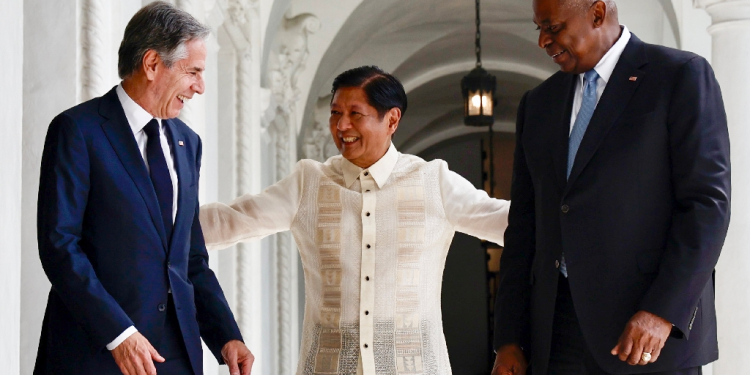(AFP) – The United States will provide $500 million in military funding to the Philippines, US Secretary of State Antony Blinken said Tuesday, as Washington boosts ties with Manila in the face of China’s growing assertiveness. Blinken was in Manila with US Defense Secretary Lloyd Austin as part of an Asia-Pacific tour to strengthen Washington’s latticework of alliances aimed at countering Beijing.
“We’re now allocating an additional $500 million in foreign military financing to the Philippines to boost security collaboration with our oldest treaty ally in this region,” Blinken told a joint news conference. Blinken described it as a “once in a generation investment” to help modernise the Philippine armed forces and coast guard. “We’re building on a lot of progress the Philippines has already made to be better positioned to defend their sovereignty. That is what this is about.”
Blinken and Austin earlier met with President Ferdinand Marcos, who has taken a strong stand against Chinese actions in the South China Sea, before holding “2+2” talks with their Philippine counterparts Enrique Manalo and Gilberto Teodoro. The latest high-level US visit follows a series of escalating confrontations between Philippine and Chinese vessels in the disputed waterway that have raised concern that Washington could be dragged into a conflict due to its mutual defence treaty with Manila.
The additional funding is part of the $2 billion in foreign military financing approved by the United States in April. The Philippines began a modest modernisation program more than a decade ago under former president Benigno Aquino to strengthen its armed forces, one of the weakest in Asia. It has continued under Marcos, who has also ordered the military to increase their focus on external threats. Teodoro said the US funds would be used to help secure the Philippines’ “credible deterrent posture,” as it seeks to boost its cybersecurity capabilities among other things.
– ‘Fanning the flames’ – There has been a revolving door of top US officials passing through the Philippines since Marcos took office in 2022 and adopted a more US-friendly foreign policy. Marcos expanded an agreement giving American troops access to nine Philippine military bases, including in the far north of the country, which has infuriated Chinese leaders.
The Enhanced Defence Cooperation Agreement, or EDCA, allows US troops to rotate through the bases and also store defence equipment and supplies at them. Teodoro said Manila and Washington had agreed to “fully implement” EDCA projects and boost investment in the sites. The Philippines’ proximity to the hotly contested South China Sea, as well as self-ruled Taiwan, would make it a key partner for the United States if a conflict were to break out in the region.
Beijing claims almost the entire waterway, despite an international ruling that its assertion has no legal basis, and considers democratic Taiwan to be part of its territory. Marcos told Austin and Blinken that he was “very happy” about the open lines of communication with the United States, which helped Manila be “agile in terms of our responses” on issues including the South China Sea.
Blinken and his Chinese counterpart Wang Yi sparred on Saturday over the South China Sea when they met on the sidelines of the foreign ministers meeting of the Association of Southeast Asian Nations in Laos. Wang told Blinken the United States should “refrain from fanning the flames, stirring up trouble and undermining stability at sea,” according to a foreign ministry statement. “The risks and challenges facing China-US relations are still rising,” he said.
– Léon BRUNEAU
© 2024 AFP











